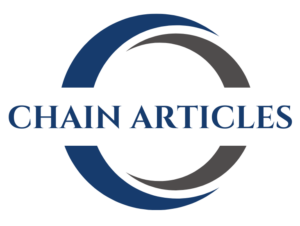Best Forex Brokers in India for 2025Forex trading is booming in India, but strict regulations from the Securities and Exchange Board of India (SEBI) and Reserve Bank of India (RBI) make choosing the right broker crucial. Whether you’re new or experienced, your broker can define your success. This guide covers the top seven forex brokers for Indian traders in 2025—IG, Saxo, Interactive Brokers, CMC Markets, FOREX.com, AvaTrade, and eToro—detailing their features, 2025 pricing, pros, cons, and concise overviews.
India’s Forex Regulatory Framework
Forex trading in India is tightly regulated. The RBI and SEBI restrict retail traders to INR-based pairs (USD/INR, EUR/INR, GBP/INR, JPY/INR) and a few non-INR pairs (EUR/USD, GBP/USD, USD/JPY) via exchanges like NSE or BSE. Leverage is capped at 50:1 for INR pairs, lower for others, to manage risk. Many Indian traders use offshore brokers for broader pair access and higher leverage, but this falls into a legal gray area. The brokers listed here are globally regulated, accept Indian clients, and emphasize fund safety, making them reliable choices.
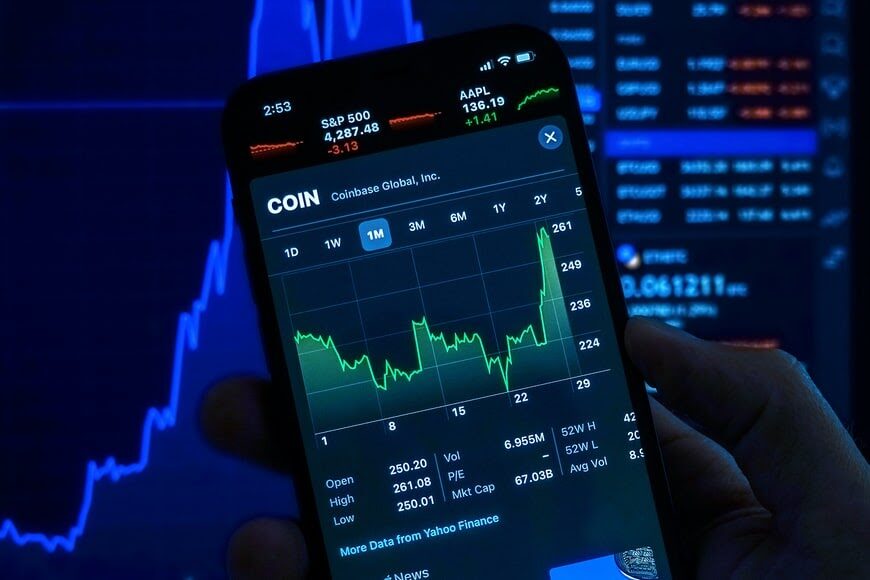
Criteria for Selecting a Top Broker
Indian traders should focus on:
- Regulation: Tier-1 licenses (FCA, ASIC, CySEC) and segregated accounts.
- Platforms: User-friendly options like MetaTrader 4/5 or proprietary apps.
- Pricing: Low spreads, commissions, and fees.
- Pairs: INR and global pairs.
- Payments: INR-friendly methods like UPI or bank transfers.
- Support: Responsive, ideally with local language options.
- Education: Tools for all skill levels.
Forex Brokers for Indian Traders
IG

IG, a global leader with 40 years of experience, offers Indian traders over 110 currency pairs, an intuitive platform, and robust charting. Regulated by FCA and ASIC, it’s trusted for fund safety, with the IG Academy app enhancing education, though not SEBI-registered.
Pricing: Spreads average 0.98 pips for EUR/USD, tightening during peak sessions. Forex Direct account commissions start at 0.2 basis points for high-volume traders. Minimum deposit is $250, with no withdrawal or inactivity fees.
Pros:
- FCA and ASIC regulation ensures high trust.
- User-friendly platform with advanced charting.
- IG Academy offers extensive educational resources.
Cons:
- Not SEBI-regulated, posing compliance risks.
- Limited INR payment options increase costs.
- Customer support for India lacks localization.
Also Read: 10 Best Forex Brokers
Saxo
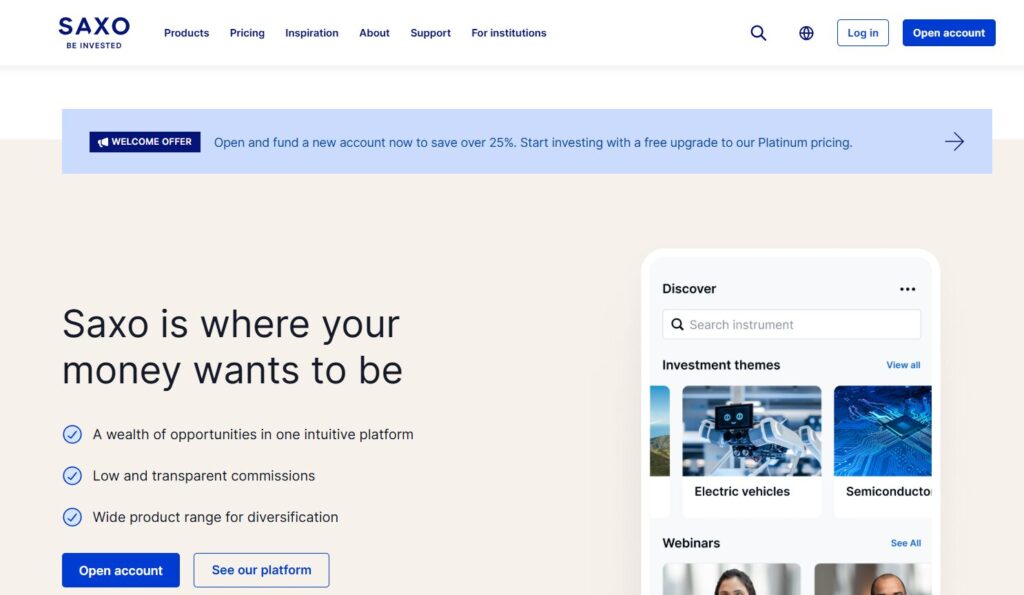

Saxo, a premium broker, targets serious traders with 338 forex pairs and 40,000+ instruments. Regulated by FCA, ASIC, and DFSA, its SaxoTraderGO and PRO platforms offer advanced tools and research, ideal for pros but complex for beginners.
Pricing: Spreads start at 1.0 pip for EUR/USD, with a $3 minimum commission per order (under 50,000 units). Minimum deposit is $2,000. No inactivity fees noted.
Pros:
- Access to 40,000+ instruments.
- Advanced platforms for professional trading.
- High-quality market research tools.
Cons:
- $2,000 minimum deposit deters beginners.
- Complex interface overwhelms newbies.
- Limited INR payment support adds fees.
Also Read: Best Forex Trading Platforms in the United States
Interactive Brokers
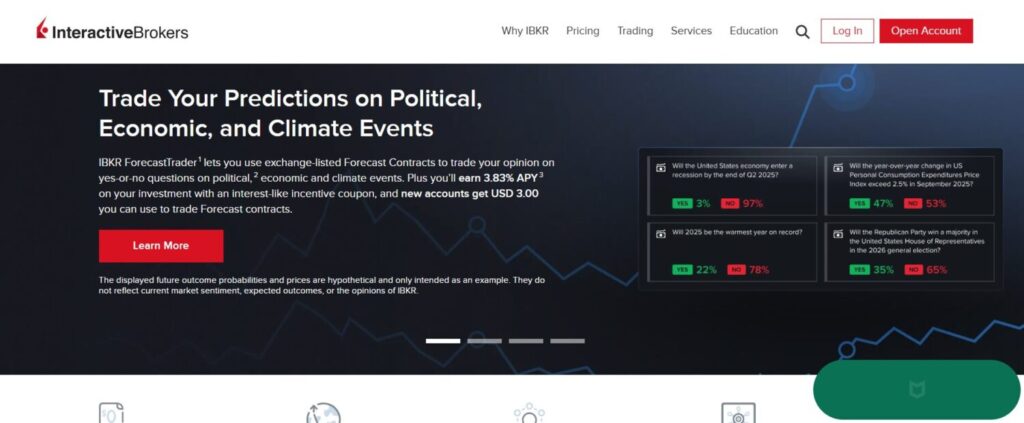

Interactive Brokers, SEBI-registered, offers Indian traders compliance and access to NSE/BSE via the Trader Workstation (TWS). It focuses on exchange-traded pairs, with low-cost pricing and INR payment support, though its platform is complex.
Pricing: Spreads average 0.59 pips for EUR/USD, with commissions at 0.2 basis points ($2 minimum per order). No minimum deposit or inactivity fees. INR payments supported.
Pros:
- SEBI registration ensures legal compliance.
- Low-cost pricing with tight spreads.
- INR payment support reduces fees.
Cons:
- No forex CFDs in India.
- TWS platform is complex for beginners.
- Limited customer support for India.
Also Read: 8 Platforms to Start Metal Trading
CMC Markets
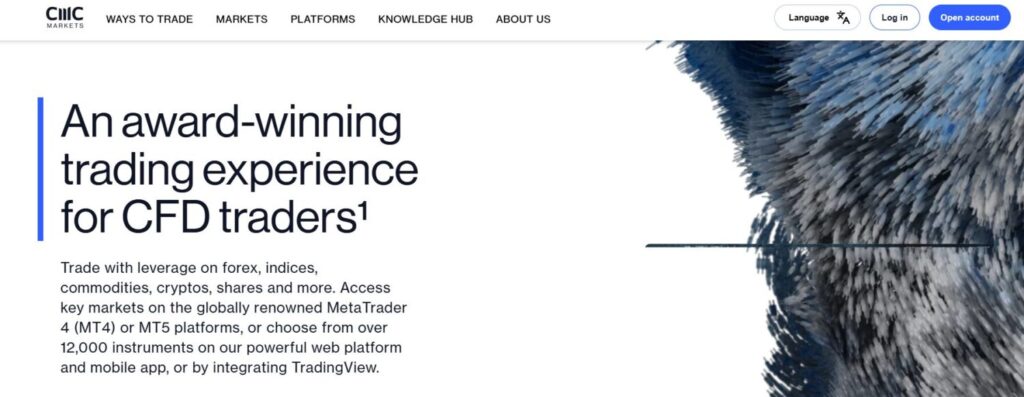

CMC Markets, regulated by FCA and ASIC, offers 12,000+ instruments via its customizable Next Generation platform and MT4. Competitive spreads and robust tools make it reliable for Indian traders, despite no SEBI registration.
Pricing: Standard account spreads average 1.11 pips for EUR/USD (commission-free). FX Active (RAW) account offers 0.0 pip spreads with a $2.50 commission per side. No minimum deposit; inactivity fees may apply after 12 months.
Pros:
- Competitive spreads, especially on RAW accounts.
- Customizable Next Generation platform.
- MT4 support for versatile trading.
Cons:
- Limited INR payment options.
- Inactivity fees after 12 months.
- Not SEBI-regulated, requiring caution.
Also Read: BYDFI vs. Coinbase vs. Kraken
FOREX.com
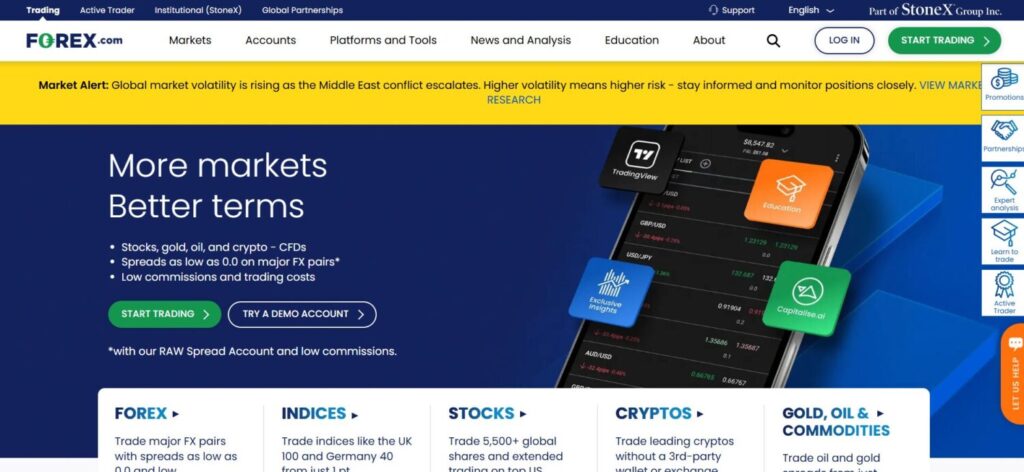

FOREX.com, regulated by FCA and CIMA, specializes in forex with 80+ pairs. It offers MT4/5 and a proprietary platform, with a low $100 minimum deposit, making it accessible for Indian traders despite no SEBI registration.
Pricing: Standard account spreads start at 1.2 pips for EUR/USD (commission-free). RAW account has 0.0 pip spreads with a $7 commission per $100k traded. Minimum deposit is $100, with potential inactivity fees.
Pros:
- Forex-focused with 80+ pairs.
- MT4/5 support for flexibility.
- Low $100 minimum deposit.
Cons:
- Limited localized support for India.
- Inactivity fees may apply.
- Not SEBI-regulated, adding risk.
Also Read: 6 Best Forex Brokers for Easy Trading
AvaTrade
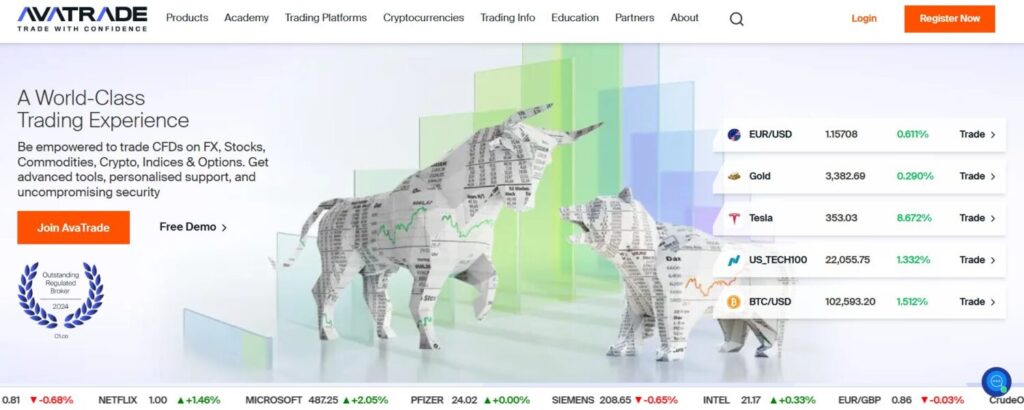

AvaTrade, regulated by ASIC and CBI, is beginner-friendly with a $100 minimum deposit and 44 forex pairs. Its AvaTradeGO app, MT4/5, and copy trading features make it appealing for new Indian traders, though not SEBI-registered.
Pricing: Spreads average 0.9–1.2 pips for EUR/USD, commission-free. Inactivity fees apply after three months ($50 quarterly). INR payments limited.
Pros:
- Low $CM00 minimum deposit.
- User-friendly AvaTradeGO app.
- Copy trading for beginners.
Cons:
- Variable spreads can be higher.
- Inactivity fees after three months.
- Not SEBI-regulated, a concern.
Also Read: 8 Best AI Recruiting Tools
eToro


eToro, regulated by CySEC and ASIC, excels in social trading, letting Indian traders copy pros. Its simple platform offers 51 forex pairs, crypto, and stocks, ideal for beginners despite no SEBI registration.
Pricing: Spreads average 1.5 pips for EUR/USD, commission-free. Minimum deposit is $200, with a $10 monthly inactivity fee after 12 months. INR payments limited.
Pros:
- Social trading ideal for beginners.
- Simple, intuitive platform.
- Diverse assets beyond forex.
Cons:
- Higher spreads reduce efficiency.
- Inactivity fees after 12 months.
- Not SEBI-regulated, requiring vigilance.
Also Read: Best 7 Binance Alternatives : Is Binance Going Down?
Comparison Table
| Broker | Regulation | Min. Deposit | Spread (EUR/USD) | Commission | Platforms | INR Payments | Support (India) |
|---|---|---|---|---|---|---|---|
| IG | FCA, ASIC | $250 | 0.98 pips | 0.2 basis points* | Web, Mobile, MT4 | Limited | Moderate |
| Saxo | FCA, ASIC, DFSA | $2,000 | 1.0 pips | $3 min (under 50k) | SaxoTraderGO/PRO | Limited | Moderate |
| Interactive Brokers | SEBI, FCA, ASIC | $0 | 0.59 pips | $2 min (0.2 bp) | TWS | Yes | Limited |
| CMC Markets | FCA, ASIC | $0 | 1.11 pips (Std) | $5 round turn (RAW) | Next Generation | Limited | Moderate |
| FOREX.com | FCA, CIMA | $100 | 1.2 pips (Std) | $7 per $100k (RAW) | Web, MT4/5 | Limited | Limited |
| AvaTrade | ASIC, CBI | $100 | 0.9–1.2 pips | None | AvaTradeGO, MT4/5 | Limited | Good |
| eToro | CySEC, ASIC | $200 | 1.5 pips | None | Web, Mobile | Limited | Good |
Tips for Indian Forex Traders
- Demo Accounts: Practice risk-free with brokers’ demo platforms.
- Regulation Check: Confirm tier-1 licenses and segregated accounts.
- Fee Awareness: INR conversions add costs; seek UPI-friendly brokers.
- Compliance: Stay updated on RBI/SEBI rules.
- Risk Management: Use stop-losses and respect leverage limits.
Conclusion
In 2025, India’s forex market thrives despite strict regulations, with top brokers—IG, Saxo, Interactive Brokers, CMC Markets, FOREX.com, AvaTrade, and eToro—offering diverse options. IG excels in versatility, Interactive Brokers ensures SEBI compliance, Saxo and CMC suit pros, AvaTrade and eToro attract beginners, and FOREX.com balances both. Choosing a broker depends on your experience, goals, and regulatory needs. Prioritize low costs, reliable platforms, and compliance to succeed. Research thoroughly, test demos, and trade wisely to navigate this dynamic market effectively.
Frequently Asked Questions (FAQs)
Is forex trading legal in India?
Yes, forex trading is legal but restricted to INR-based pairs (USD/INR, EUR/INR, GBP/INR, JPY/INR) and select non-INR pairs via SEBI-regulated exchanges like NSE/BSE. Offshore brokers operate in a gray area, so ensure they’re regulated by FCA, ASIC, or CySEC.
Which broker is best for beginners in India?
AvaTrade and eToro are ideal for beginners due to their low minimum deposits ($100 and $200), user-friendly platforms, and features like copy trading. Their educational resources help new traders learn the ropes.
Can I use UPI for deposits with these brokers?
Interactive Brokers supports INR payments, potentially including UPI. Other brokers (IG, Saxo, CMC, FOREX.com, AvaTrade, eToro) have limited INR options, often requiring bank transfers or cards, which may incur conversion fees.
What are the risks of using offshore brokers?
Offshore brokers like IG, Saxo, and eToro aren’t SEBI-regulated, operating in a legal gray area. Risks include potential RBI scrutiny and currency conversion fees. However, their global regulation (FCA, ASIC) ensures fund safety if chosen carefully.
Do these brokers offer demo accounts?
Yes, all seven brokers—IG, Saxo, Interactive Brokers, CMC Markets, FOREX.com, AvaTrade, and eToro—provide demo accounts, allowing Indian traders to practice strategies risk-free before committing real funds.
